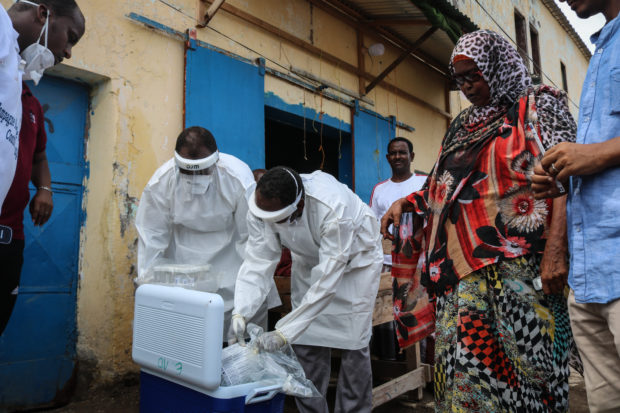Hard-hit Djibouti to ease virus lockdown measures

Staff members of the Ministry of Health visit residents to take samples during the first day of mass testing for the COVID-19 coronavirus in Djibouti on May 2, 2020. AFP
DJIBOUTI — Djibouti, the tiny Horn of Africa nation with the highest prevalence of coronavirus cases on the continent, plans to begin lifting lockdown measures largely for economic reasons, its foreign minister announced Sunday.
“By tomorrow the process of incrementally unlocking the country will start in Djibouti,” Mahmoud Ali Youssouf said in one of a series of Twitter posts.
“The stakes are high but there is no other option: people need to make their living and go to work,” he added.
The tiny but strategically important country that hosts major US and French military bases has recorded 1,189 positive cases — small on a global scale, but the highest in East Africa. Three people have died.
The Africa Centers for Disease Control and Prevention says Djibouti has the highest number of cases in Africa relative to its population of around one million people, though its testing has also outpaced many of its neighbors.
On March 23 the government announced a nationwide lockdown, closing borders and places of worship, banning public transport and allowing only workers in essential industries to go outside.
Yet the measures have been largely ignored, with large crowds still common in the capital city.
President Ismail Omar Guelleh, in power since 1999, warned last month of “even tougher measures” if the population did not respect confinement rules.
But the strict imposition of the lockdown has prompted criticism of Guelleh, who could run for the presidency again next year after term limits were abolished in a constitutional change.
Youssouf’s Twitter posts indicated the government has had a change of heart.
Public transport will resume and places of worship will officially be allowed to reopen, though they must follow “very strict measures of protection” like requiring masks and enforcing physical distancing, Youssouf said.
“The borders will remain closed except for humanitarian personnel who will follow an agreed protocol of prevention to avoid reintroducing a new form of the virus,” he said, without elaborating.
Even with those measures in place, Youssouf acknowledged that “new epicenters of contamination could emerge in the capital city” and said a national taskforce would continue to follow the spread of the virus.
For more news about the novel coronavirus click here.
What you need to know about Coronavirus.
For more information on COVID-19, call the DOH Hotline: (02) 86517800 local 1149/1150.
The Inquirer Foundation supports our healthcare frontliners and is still accepting cash donations to be deposited at Banco de Oro (BDO) current account #007960018860 or donate through PayMaya using this link.